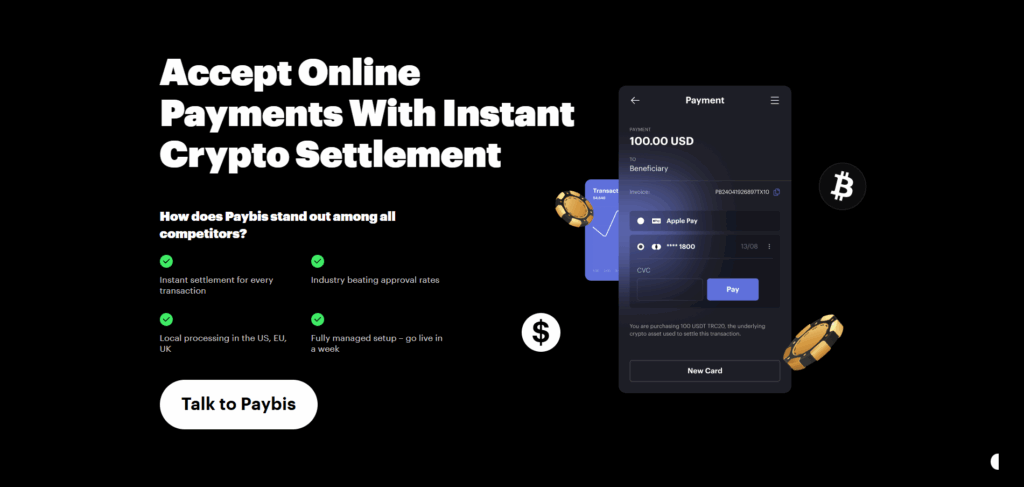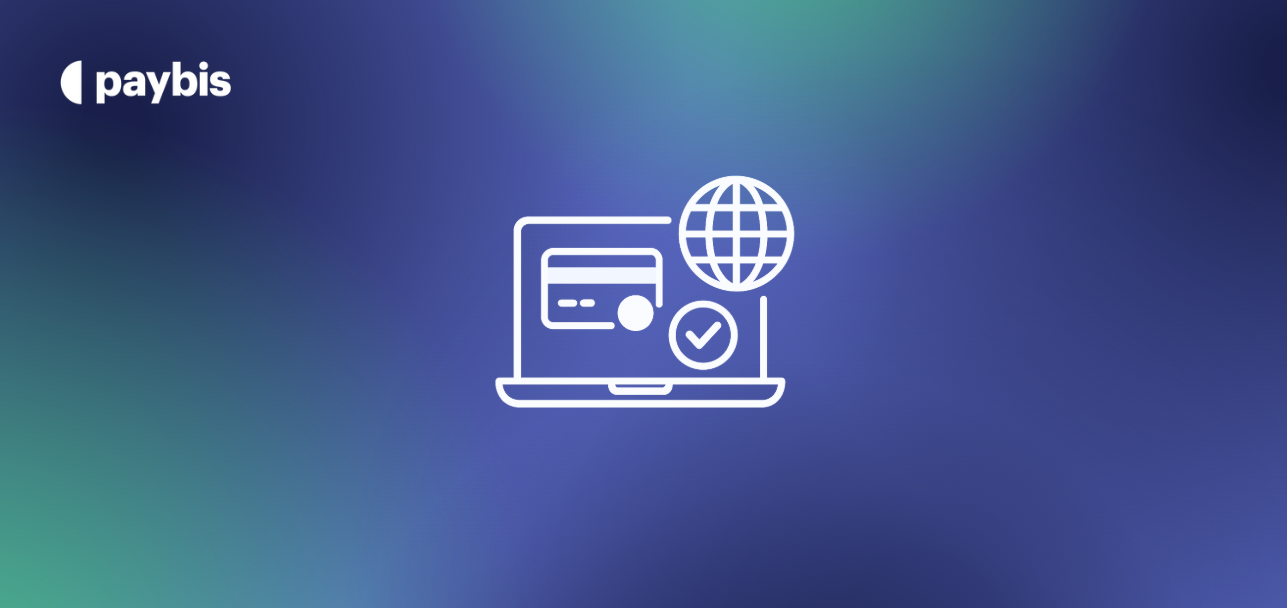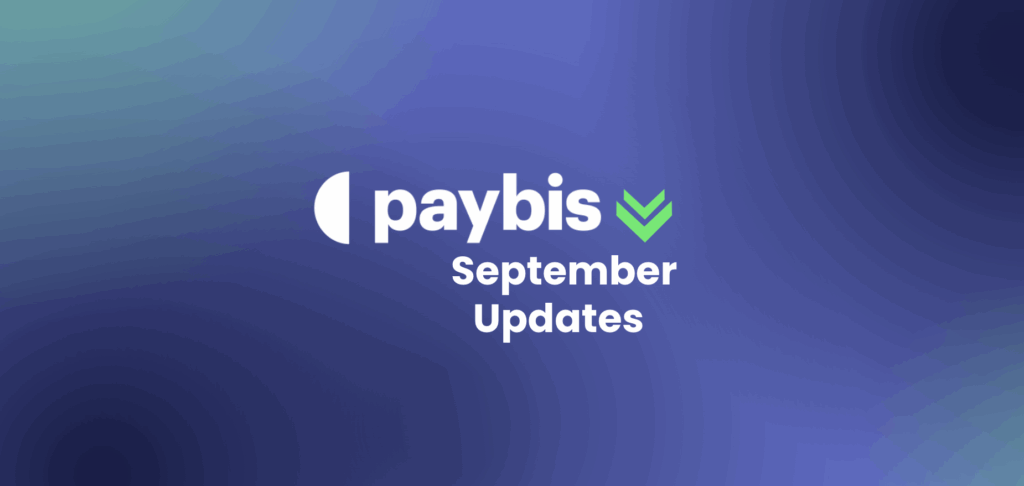Accept International Credit Card Payments Online: Paybis vs Traditional Payment Gateways
The payment gateway comparison game has never been more important. The market is booming and is expected to reach $130 billion by 2030. But the numbers tell a concerning story: nearly 70% of online shopping carts are abandoned before checkout due to a lack of payment methods and long processing times.
Enter alternative payment gateways, like Paybis. In this comprehensive guide, we’ll compare traditional payment systems with Paybis Payment Processing, how they’re different, and, more importantly, explain why your business should consider enhancing your payment rails.
Table of contents
Understanding Traditional Payment Gateways
Traditional payment gateways act as digital middlemen that securely connect your online store with financial institutions to process customer payments. These platforms authorize transactions, encrypt data, and move funds from your customer’s account to yours.
How Traditional Gateways Process International Payments
International payments move through a complex path with multiple intermediaries. The customer enters payment details, which the gateway encrypts and sends to the acquiring bank. The information then travels to card networks, which verify it before it reaches the customer’s bank.
Once customer transactions are authorized, businesses receive funds in 2 to 5 days, a process that involves the transfer of money between bank accounts as a core part of the process.
Cross-border transactions make this process more complex. Traditional gateways must convert currencies, follow different regional regulations, and route payments through correspondent banks. Each extra intermediary adds to the complexity and cost.
Common Issues: Delays, High Fees, and Limited Currencies
Most businesses prefer traditional payment processors due to their security, long-standing experience, and convenience. However, since there are several steps involved in the payment process, in addition to the added difficulty of processing cross-border payments, traditional bank transfers and credit card payments can come with several challenges:
- Processing delays: Cross-border transfers take days to complete because of interbank settlement processes and compliance checks.
- High costs: International transactions cost up to ten times more than domestic ones. These include processing charges, currency conversion markups, and hidden costs.
- Limited currency support: Traditional gateways support only major currencies. This creates friction for customers in emerging markets.
- Compliance complexity: Traditional payment processors invest heavily in fraud prevention and fraud protection measures, which can sometimes add to processing delays and operational costs.
- Outdated technology: Platforms depend on batch processing instead of live monitoring, which can create more bottlenecks.
Comparing Popular Payment Methods: Stripe, PayPal, Authorize.net
Stripe processes payments in 46 countries and supports 135+ currencies. Businesses can receive payments in USD and other major currencies, but may face additional fees for currency conversion. This makes it a strong choice for international transactions. Yet it charges an extra 1% for currency conversion.
PayPal leads the market with a 42.35% share and operates in over 200 countries. However, it charges a 2.5% currency conversion fee plus a 1% cross-border fee. These fees affect profit margins by a lot.
Authorize.net, while not as popular, still serves businesses in the US, Canada, the UK, Europe, and Australia, offering secure, reliable, and scalable payment solutions for small to medium-sized businesses.
While this makes Authorize.net a great choice for local or regional businesses, anyone looking to operate internationally will have to look for other providers.
Alternative Payment Providers: Introducing Paybis Payment Processing
The Paybis Payment Processing is a robust, fully integrated payment facilitation (PayFac) solution enabling merchants to accept fiat payments from customers and receive stablecoins directly into their corporate wallets.
Tailored for modern, digital-first businesses, this product seamlessly merges traditional fiat payment processing with instant crypto settlements. This effectively eliminates the need for any intermediaries.
This solution is an easy-to-integrate payment module for merchant websites or apps. It lets customers pay with their preferred fiat method, while merchants instantly receive crypto payments. Paybis manages the conversion seamlessly in the background.

What Makes Paybis Different for Global Businesses
Paybis delivers plug-and-play crypto infrastructure that helps businesses scale faster and serve different user demographics around the world. From fully compliant payment facilitation to stablecoin payouts and secure crypto wallets, our solutions are fast to deploy, easy to integrate, and designed to remove operational headaches.
One of the key motivations of developing crypto-backed payment gateways was to target specific pain points, especially cross-border payments and banking restrictions preventing global reach. Today, Paybis includes an efficient and user-friendly platform that streamlines international transactions for businesses, making payments faster and easier to manage.
Simplified Onboarding Under 24 Hours
While an increasing number of businesses are integrating crypto into their payments workflows, the reality is, there’s a lack of reliable solutions, resulting in long onboarding times. In contrast, thanks to Paybis’ decade-long experience working with top developers and compliance experts, business accounts can be onboarded in just under 24 hours.
Paybis provides easy access to global payment solutions without the lengthy setup required by traditional gateways. Additionally, our “No-KYC flow” option lets customers make their original purchases without verification.
Support for Multiple Fiat Currencies and Crypto Options
Traditional gateways limit currency choices, but Paybis offers:
- 50+ payment methods across 180 countries
- 80+ fiat currencies for customer payments, supporting multiple currencies and alternative payment methods for seamless global transactions
This wide coverage allows SaaS platforms, Ecommerce stores, and service providers to accept payments in their customers’ local currencies with minimal foreign exchange fees. Paybis also makes it possible for businesses to accept digital currencies and manage digital assets alongside traditional payment options, providing a comprehensive suite of payment solutions.
Real-Time Exchange Rates and Transparent Fees
Paybis uses live exchange calculators that show current rates for 80+ fiat currencies. This removes hidden markup fees that traditional gateways often build into their exchange rates.
Funds in your Paybis account are not converted automatically because you choose when and if to convert, giving your business more control over currency management. The platform splits fees into two simple categories:
- Service fee: Paybis commission (varies by payment method)
- Network fee: Blockchain transaction costs
Businesses see exactly what they pay without unexpected charges. This clarity, combined with instant settlements through stablecoin options, enables seamless transactions for global businesses and creates a payment system that fits today’s digital world.
Paybis vs Traditional Gateways
Let’s take a closer look at how Paybis measures up against other payment processors across a variety of key features that matter to businesses worldwide.
Payment Gateway Fees Comparison
Stripe takes 2.9% plus $0.30 for each transaction, adds 1% for international cards, and another 1% when converting currency. PayPal’s rates run even higher at 2.99% plus $0.49 per transaction, with a 1.5% cross-border fee and 3-4% currency conversion charge.
As a result, businesses end up paying significantly more with traditional gateways compared to platforms that offer lower fees and competitive rates. Paybis keeps things clear by splitting costs into service and network fees without hiding extra charges.
Currency Conversion
According to Bankrate, customers using DCC (Dynamic Currency Conversion) in Europe were found to pay an average of 5% markup over interbank exchange rates, with some cases charging as high as 13.7%
Paybis uses up-to-the-minute exchange calculators with minimal markup, giving businesses rates that come much closer to the interbank rate. Additionally, we streamline currency conversions and improve transaction speed for international payments, making cross-border transactions faster and more efficient.
Speed of Settlement
In the U.S., automated clearing house (ACH) transactions usually settle and clear within 1–3 business days, whereas wire transfers, particularly internationally, take 2–5 business days. To be fair, these processing periods may vary, but the fact that processing times take multiple days stands.
In contrast, crypto transactions can be processed within seconds to minutes, depending on network congestion, block times, and transaction amounts.
Seamless Integration
Stripe provides many API options for developers, but you need technical expertise. PayPal charges $25 monthly plus $0.10 per transaction when you want a custom checkout through Payflow Pro.
Paybis, on the other hand, offers a single integration point and an intuitive interface, making it easier for businesses to get started without the need to employ an expert developer team.
Security and Compliance
Traditional gateways face tougher compliance challenges across countries. Payment service providers must now balance regulatory compliance with customer experience. The same goes for crypto, with regulations like MiCA in the EU and the recent Stable and Genius Acts in the US.
Paybis enforces strict AML (Anti-Money Laundering) and KYC (Know Your Customer) compliance requirements. Moreover, we make sure to take care of compliance requirements for our clients.
Our licenses:
- MSB registration in the US
- MSB registration in Canada
- FinProm registration in the UK
- VASP registration in Poland
When to Choose Paybis Over Traditional Gateways
Some business scenarios work better with alternative payment systems. Certain features are crucial for businesses looking to expand globally, as they can significantly impact international growth and payment efficiency.
- iGaming: Enable acceptance of global fiat payments with instant crypto settlements, offering full chargeback protection, no rolling reserves, and MCC 7995 compliance.
- Fintech PSPs: Streamline backend operations through a single integration that provides multi-acquirer access and supports alternative payment methods (APMs).
- Digital Services: Deliver worldwide service access while receiving crypto payments settled in real time.
- eCommerce: Grow into new markets with multi-currency capabilities, smooth fiat-to-crypto conversion, and robust fraud prevention.
Comparison Table
|
Feature |
Paybis |
Stripe |
PayPal |
|---|---|---|---|
|
Processing fees |
Clear service fee structure with network charges |
2.9% + $0.30 per transaction |
2.99% + $0.49 per transaction |
|
International/cross-border fees |
No concealed markups mentioned |
Additional 1% |
1.5% cross-border fee |
|
Currency conversion fees |
Low markup with immediate rates |
1% |
2.5–4% |
|
Currency support |
80+ fiat currencies, 1000+ cryptocurrencies |
135+ currencies |
25 currencies |
|
Geographic coverage |
180+ countries |
46 countries |
Available in 200+ countries |
|
Settlement time |
Minutes (with crypto options) |
2–5 business days |
2–5 business days |
|
Onboarding time |
15 minutes |
6–8 months to set up merchant account |
6–8 months to set up merchant account |
|
KYC requirements |
“No-KYC flow” option available for original purchases |
Standard KYC requirements |
Standard KYC requirements |
|
Integration |
Direct URL integration |
Technical expertise needed |
$25/month + $0.10/transaction for custom checkout |
Conclusion
As digital commerce breaks down borders, payment systems need to adapt. Paybis offers major advantages over traditional payment gateways for businesses that operate worldwide. Stripe and PayPal may dominate the market, but they come with real limitations, high fees, slow settlements, and complex setup processes. Paybis tackles these challenges head-on.
Interested in learning more? Reach out to our sales team to schedule an intro call today!
FAQ
Are there any situations where traditional payment gateways might be preferable to Paybis?
Traditional gateways may still be suitable for businesses primarily operating in regions with high card adoption or those facing strict regulatory requirements. Companies concerned about cryptocurrency volatility might also prefer traditional options. It’s important for businesses to evaluate their specific needs and circumstances when choosing a payment solution.
How long does it take to set up an account with Paybis compared to traditional gateways?
Paybis offers a streamlined verification process that takes about 15 minutes for first-time users, with subsequent transactions processed in just 5 minutes. This is significantly faster than the typical long merchant account setup required by many traditional payment gateways.
Can Paybis help businesses reach customers in emerging markets?
Yes, Paybis is particularly useful for businesses targeting emerging markets. It supports over 80 fiat currencies, allowing e-commerce stores to serve customers in regions with limited banking infrastructure but growing digital payment adoption.
How do Paybis's fees compare to those of traditional payment gateways?
Paybis uses a transparent fee structure with a service fee and network fee, without hidden markups. Traditional gateways like Stripe and PayPal typically charge higher fees, especially for international transactions, with additional costs for currency conversion and cross-border transfers.
What advantages does Paybis offer over traditional payment gateways for global businesses?
Paybis offers several advantages, including support for 50+ payment methods across 180 countries, real-time exchange rates with minimal markups, and faster settlement times through cryptocurrency options. It also provides a simplified onboarding process and transparent fee structure, making it particularly beneficial for businesses operating internationally.
Disclaimer: Don’t invest unless you’re prepared to lose all the money you invest. This is a high‑risk investment and you should not expect to be protected if something goes wrong. Take 2 mins to learn more at: https://go.payb.is/FCA-Info



